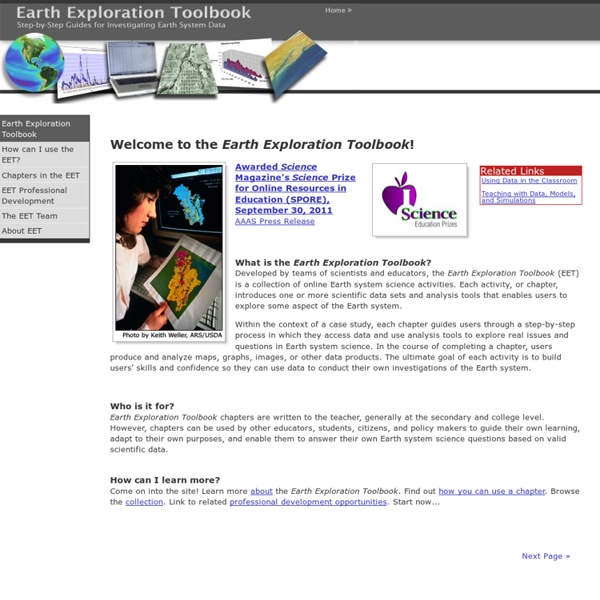Earth Exploration Toolbook
Awarded Science Magazine's Science Prize for Online Resources in Education (SPORE), September 30, 2011 AAAS Press Release What is the Earth Exploration Toolbook? Developed by teams of scientists and educators, the Earth Exploration Toolbook (EET) is a collection of online Earth system science activities. Within the context of a case study, each chapter guides users through a step-by-step process in which they access data and use analysis tools to explore real issues and questions in Earth system science. Who is it for? Earth Exploration Toolbook chapters are written to the teacher, generally at the secondary and college level. How can I learn more? Come on into the site!
Density Tower - Magic with Science at Steve Spangler Science
Start your column by pouring the honey into the cylinder. Now, you will pour each liquid SLOWLY into the container, one at a time. It is very important to pour the liquids slowly and into the center of the cylinder. Make sure that the liquids do not touch the sides of the cylinder while you are pouring. It’s okay if the liquids mix a little as you are pouring. The layers will always even themselves out because of the varying densities. The same amount of two different liquids will have different weights because they have different masses. To test this, you might want to set up a scale and measure each of the liquids that you poured into your column. Density is basically how much "stuff" is smashed into a particular area... or a comparison between an object's mass and volume. The same goes for the small objects that you dropped into your density column. In the materials, we had you grab a bunch of miscellaneous tiny objects. Why do you think these two phenomena happen?
PlantingScience.org :: fostering student research through scientific inquiry and online mentorship
Ten Websites for Science Teachers
We all know that the web is full of excellent web resources for science teachers and students. However, unless you live on the web, finding the best websites can become quite a challenge. This isn't a "Top Ten" list -- instead, it is a list of websites that I either use on a regular basis or just find interesting. From teaching resources for the nature of science and authentic field journals to wacky videos about numbers, I am sure that you will find something in the following list the works for you! Please share your favorite science web resources in the comment section! 1) Understanding Science UC Berkeley's Understanding Science website is a "must use" for all science teachers. 2) Field Research Journals The Field Book Project from the National Museum of Natural History and the Smithsonian Institution Archives intends to create a "one stop" archive for field research journals and other documentation. 3) Evolution 4) PhET Simulations 5) Earth Exploration 6) EdHead Interactives video
Related:
Related:




The Earth Exploration Toolbook is amazing. I highly recommend it. Developed by teams of scientists and educators, the Earth Exploration Toolbook (EET) is a collection of online Earth system science activities. Each activity, or chapter, introduces one or more scientific data sets and analysis tools that enables users to explore some aspect of the Earth system.
Within the context of a case study, each chapter guides users through a step-by-step process in which they access data and use analysis tools to explore real issues and questions in Earth system science. In the course of completing a chapter, users produce and analyze maps, graphs, images, or other data products. The ultimate goal of each activity is to build users' skills and confidence so they can use data to conduct their own investigations of the Earth system.
Who is it for?
Earth Exploration Toolbook chapters are written to the teacher, generally at the secondary and college level. However, chapters can be used by other educators, students, citizens, and policy makers to guide their own learning, adapt to their own purposes, and enable them to answer their own Earth system science questions based on valid scientific data. by drsinasoul May 27